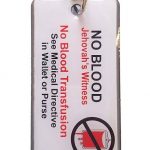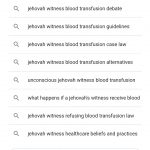Jehovah’s Witnesses, Blood Transfusion and the legal and Ethical Dilemma – Agboola Peter
A small group of people belonging to a certain religion, called Jehovah’s Witnesses (JW) do not accept blood transfusion or blood products, based on biblical readings. Thousands of them have died due to this archaic believe.
This is 2019 for God’s sake.
When such group of people are in need of health care, their faith and belief is an obstacle for their proper treatment, and poses legal, ethical and medical challenges for attending health care provider.

Due to the rapid growth in the membership of this group worldwide, physicians attending hospitals should be prepared to manage such patients.
Appropriate management of such patients entails:
1. Understanding of ethical and legal issues involved.
2. Providing meticulous medical management.
3. Use of prohaemostatic agents, and techniques to reduce blood loss and hence, reduce the risk of need for blood transfusion.
The JW religion, founded in 1872, by CHARLES TAZE RUSSELL during the Adventist movement in Pittsburgh is an international organization, the followers of which believe that the Bible is the true word of God.
They are politically neutral, do not salute flags, do not enlist in the military nor vote in public elections. They celebrate neither Christmas nor birthdays, and must satisfy a minimum monthly time requirement to their ministry.
In 1931, the organization officially became known as the “Jehovah’s Witnesses”. In 1945, the governing body of the JW “The Watchtower”, introduced “BLOOD BAN”, based on the strict literal interpretation of several scriptural passages of New world Translation of the Bible.
Everything that lives and moves will be food for you. Just as I gave you the green plants, I now give you everything. However you must not eat meat that has its lifeblood still in it. NIB; Gen 9 vs 34.
Because the life of every creature is its blood, that is why, I have said to the Israelites: “You must NOT EAT the blood of ANY creature, because the life of every creature is its blood; anyone who eats it must be CUT-OFF”. NIB; Leviticus 17 vs14.
It seemed good to the Holy Spirit and to us not to burden you with anything beyond the following requirements: You are to abstain from food sacrificed to idols, from blood, from the meat of strangled animals and from sexual immorality. NIB; Acts 15:28-29.
According to 2018 statistics, there are 8,579,909 JW globally and around 390,250 in Nigeria, and their number is rapidly increasing with the highest members in USA with 1,234,877. Source: JW website.
When confronted with such set of patients, blood free major surgery will be a great challenge to both the anaesthetic and surgical teams. It is important to explain all the available options to patients who refuse blood and blood products.

It is also important to know the position of the JW on the medical treatment and which blood or blood products are acceptable to them. Thee techniques learnt from treating JW patient may prove beneficial to all undergoing major surgery.
Respect for patient’s autonomy and human rights require obtaining informed consent before any medical intervention. This is fundamental to good medical practice.
The rejection of blood transfusions cause an ethical dilemma between the patient’s freedom to accept or to reject a medical treatment even unto death (i.e., autonomy), and the physician’s duty to provide optimal treatment.
A mentally competent individual has an absolute moral and legal right to refuse or reject the consent for medical treatment or transfusion except when he has diminished decision-making capacity or a legal intervention mandates treatment.
Many JW carry an ‘advance directive’ prohibiting blood transfusion and often have a detailed Health Care Advance Directive (Living Will). Copies are usually lodged with their General Practitioner, family and friends. Case law is now very clear that such directive is legal.

Check out the religious views of other religious groups on blood transfusion here




















